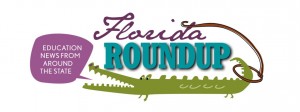 Around the state: The Florida Board of Education is expected to meet on new rules, leadership changes are afoot in Hillsborough, teacher recruitment is facing hurdles statewide and the sales tax holiday is around the corner. Here are details about those stories and other developments from the state's districts, private schools and colleges and universities:
Around the state: The Florida Board of Education is expected to meet on new rules, leadership changes are afoot in Hillsborough, teacher recruitment is facing hurdles statewide and the sales tax holiday is around the corner. Here are details about those stories and other developments from the state's districts, private schools and colleges and universities:
Broward: A discussion on whether to significantly increase pay for Broward county teachers and principals has been postponed for another week due to concerns the proposal feels rushed. School Board member Allen Zeman unveiled the proposal at a Tuesday meeting to raise average total compensation for teachers to $100,000 by 2025, up from an average of $78,000 today. That amount includes base salary, retirement benefits and health care. Total compensation for principals and assistant principals would increase to an average of $150,000, up from about $137,000, according to Zeman. “We need to make sure that we compensate our most valuable resource in a way that is a reflection of the respect that they're held in Broward County,” Zeman said. WLRN.
Hillsborough: Superintendent Van Ayres announced a round of district leadership changes this week that will affect everything from personnel to family engagement as the new school year approaches. Ayres replaced Addison Davis this month. Davis took a job at a consulting firm. “As we prepare for our students to return, now is the time to come together, refocus on our collective goals, and implement strategies to move forward purposefully,” Ayres wrote in an email to staff. Tampa Bay Times.
Pinellas: One career path that has become less popular over the past few decades as college freshmen prepare to start school this fall semester and decide on a major to pursue: education. The fact isn't surprising to some. "We have the fourth largest economy in America. We're 48th in teacher pay," said Lee Bryant, president of the Pinellas Classroom Teachers Association. Between new legislation and low wages statewide, some say it will be tougher for the state to recruit new teachers. Data from the National Center for Education Statistics shows that while enrollment in college has gone up over several decades, choosing to graduate with a degree in education has dropped. WTSP.
Bay: A church held its back-to-school block party at Daffin Park in Panama City. About 250 students of all ages lined up choosing backpack-filled supplies to get ready for the first day of classes. “I can’t really describe it but it’s just and amazing feeling to know that we’re able to help and give back to the community because we need this with and I know a lot of students with prices going up parents need the help too,” Event Organizer Charita Collier said. WJHG.
Sales tax holiday: Florida's annual Back-to-School "sales tax holiday" is set to provide an extended period of tax-free shopping this year. The sales tax holiday runs from July 24 until Aug. 6 to provide a chance for families to prepare for the upcoming school year and save money on essential purchases. During the tax holiday, Florida will waive the 7.02% sales tax as well as any local option taxes on various back to school items that include everything from footwear to personal computers. WSVN.
Board of Education meeting: New rules regarding gender identity and internet use in schools are expected to be approved by state officials meeting in Orlando on Wednesday. The Florida Board of Education will implement several laws approved by state legislators this year. WESH.
University and college news: The school board of Alachua county will proceed with a slightly reduced payment to Santa Fe College in the agreement that allows Alachua students to take Santa Fe classes through dual enrollment. Board members expressed concern about overpaying Santa Fe, but prioritized the resources that students receive. The board's chosen reduction only chops the school district's current payment to Santa Fe by 10%, retaining most services already included in the agreement and saving the district about $150,000. Main Street Daily News.
Opinions on schools: The Ron DeSantis administration is obsessed with targeting the LBGTQ community in Florida dishonestly, irrationally and repetitively across multiple venues. The latest salvos will be fired when the state Board of Education takes up a group of proposals that would drag Florida educators down the path of persecution. Orlando Sentinel, editorial board. Without affordable child care, graduating from college can be nearly impossible. Nicole Lynn Lewis, the 74th.
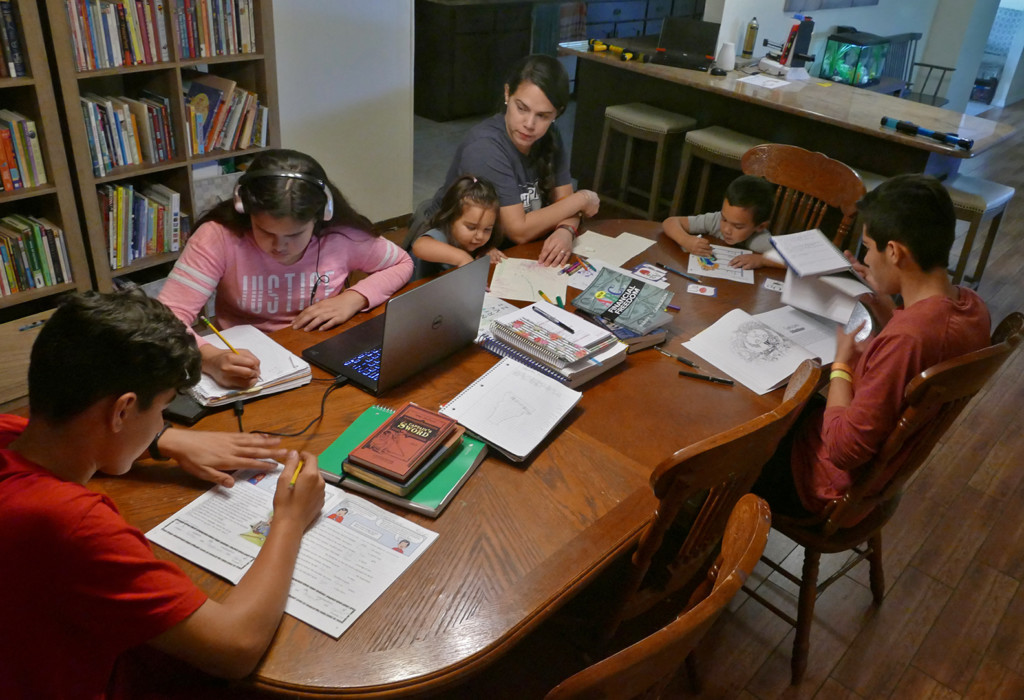
Convinced she could provide her children with all their educational needs, Evelyn Reyes of New Port Richey, Florida, began homeschooling her children eight years ago and realized she could combine education time with family time. PHOTO: Lance Rothstein
Editor’s note: This commentary was written expressly for redefinED by Matthew H. Lee, a graduate student in education policy at the University of Arkansas; Angela R. Watson, senior research fellow at the Johns Hopkins Institute for Education Policy; and redefinED guest blogger Patrick J. Wolf, distinguished professor of education policy and endowed chair at the University of Arkansas.
“Of all tyrannies, a tyranny sincerely exercised for the good of its victims may be the most oppressive.” -- C.S. Lewis
What prompted Cevin Soling, Freedman-Martin fellow in journalism at Harvard’s Kennedy School, to choose this warning as he introduced an event at Harvard earlier this month?
The “tyranny sincerely exercised” is the presumptive ban against homeschooling that Harvard Law professor Elizabeth Bartholet recommends in her recent Arizona Law Review article, “Homeschooling: Parent Rights Absolutism vs. Child Rights to Education & Protection.”
Her proposed ban puts parents “ideologically committed to isolating their children” on trial and assumes their guilt for denying “their children any meaningful education” and subjecting their children to “terrifying physical and emotional abuse.” It shifts the burden of proof to the accused to “demonstrate they would provide a significantly superior education.”
What happened to a presumption of innocence before the law?
Far from Bartholet’s accusations, homeschooling is not a small, monolithic practice dominated “overwhelmingly” by conservative Christians. At any given time, homeschoolers make up roughly 3 percent of the school-age population, and one study published in the Peabody Journal of Education estimates that as many as 10 percent of all American students are homeschooled at some point during their academic careers.
A 2019 Center for Reinventing Public Education report finds the most rapidly growing homeschooling subgroups are people of color. Another report published in the Peabody Journal of Education noted that “The phenomenon of increasing black home education represents a radical transformative act of self-determination, the likes of which have not been witnessed since the 1960s and ‘70s.”
Meanwhile, National Center for Education Statistics data show that homeschool respondents are more concerned with the “environment of other schools” and “academic instruction” than they “desire to provide religious instruction.”
A presumptive ban against homeschooling denies at least two rights. First, it denies parents the right to govern the education of their child, proclaimed by the US Supreme Court to be their fundamental right in 1923 (Meyer v. Nebraska), 1925 (Pierce v. Society of Sisters), and 2000 (Troxel v. Granville). Second, by giving public officials the authority to conduct home visitations in homeschooling households and to forcibly enroll children in public schools against their parents’ wishes, it denies both parents and children the right to be secure in their persons and homes against unreasonable searches and seizures.
Let’s shift the burden of proof back to homeschooling’s accusers. Can they prove that public schooling delivers better academic results, strengthens democratic values and provides a surer guarantee against abuse than homeschooling?
Homeschooled children demonstrate academic outcomes equal to or better than their public-school counterparts. While we don’t know about academic outcomes for all homeschooled students, a 2010 report by Brian Ray finds that homeschoolers on average score between 15 to 30 percentage points above the national average. As for those who pursue a college education, a review by Gene Gloeckner and Paul Jones indicates that when differences are detected, homeschooled students have higher standardized test scores and college GPAs relative to their public school peers.
Homeschoolers also compare favorably to publicly schooled students on civic and democratic values. Research by Albert Cheng of the University of Arkansas finds homeschooling is associated with more political tolerance relative to public schooling. Indiana University’s Robert Kunzman reports a similar advantage in his 2009 book, “Write These Laws on Your Children: Inside the World of Conservative Christian Homeschooling.”
As for public school students, according to the 2018 National Assessment of Educational Progress (NAEP) Civics Assessment, only 24 percent of U.S. eighth-graders perform at or above NAEP “Proficient” on civics.
Finally, even public schools cannot provide an absolute guarantee against abuse. In 2004, the US Department of Education estimated that one in 10 public school students will be sexually assaulted by a public school employee by the time they graduate. While abuse anywhere is unacceptable, a presumptive ban against homeschooling assumes parents are guilty of abusing their children until proven innocent while unrealistically assuming public school personnel are always innocent of such horrible transgressions. Unfortunately, they are not.
In delivering the opinion of the Supreme Court in the 1925 case Pierce v. Society of Sisters, Justice James McReynolds wrote, “The child is not the mere creature of the State; those who nurture him and direct his destiny have the right, coupled with the high duty, to recognize and prepare him for additional obligations.” Homeschooling may be the purest expression of families exercising this right and rising up to meet this high duty.
As courts have ruled repeatedly, when homeschooling is put on trial and given due process, a fair reading of the evidence gives us no choice but to emphatically declare, “Not guilty!”
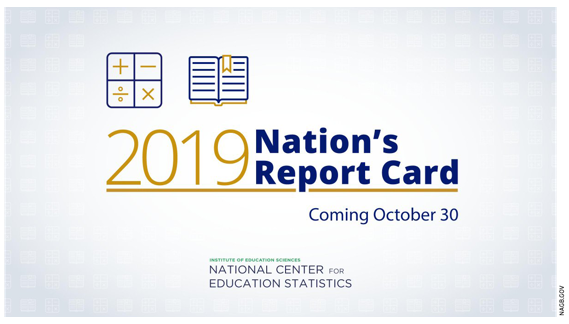 Editor’s note: Federal officials will release results from the 2019 National Assessment of Educational Progress, or NAEP, on Oct. 30. The congressionally mandated project administered by the National Center for Education Statistics, also known as “the nation’s report card,” provides group-level data on student achievement in reading and mathematics for grades 4 and 8. EducationNext asked four national education policy experts, including redefinED executive editor Matt Ladner, to predict this year’s findings. Ladner’s take is offered here.
Editor’s note: Federal officials will release results from the 2019 National Assessment of Educational Progress, or NAEP, on Oct. 30. The congressionally mandated project administered by the National Center for Education Statistics, also known as “the nation’s report card,” provides group-level data on student achievement in reading and mathematics for grades 4 and 8. EducationNext asked four national education policy experts, including redefinED executive editor Matt Ladner, to predict this year’s findings. Ladner’s take is offered here.
You can read predictions from Matthew M. Chingos, Sandy Kress, Susanna Loeb, Paul E. Peterson, Michael J. Petrilli and Morgan Polikoff in the full report, available here.
Greeks of antiquity consulted the oracle of Apollo for predictions about the future. The rituals involved the use of drugs and inhalation of mind-altering vapors among other things, like sacrificing a goat. Apparently in combination, these rituals inspired the oracle with the ability to make cryptic predictions with multiple possible interpretations – a handy skill when you don’t actually know much about the future.
The request to make predictions about the new NAEP data puts me in a dilemma similar to that of the oracle. NAEP results act like an oblong ball that bounces in unpredictable ways, and moreover, we have limited understanding of the policy factors influencing trends and even less understanding of the non-policy factors. Some of the things we think we know are probably mistaken, and we don’t agree on what we think is known.
Accordingly, I’ve decided to employ a modernized Delphic method. I’ll spare the goat, and I’m not much for inhaling vapors, but having consumed massive amounts of my drug of choice, caffeine, I will dare a few predictions.
Prediction 1: America continues to play in its academic food.
The 2009 to 2017 period proved broadly disappointing nationally. The country saw no progress in fourth-grade math or reading during this period, nor in eighth-grade math. The national average for eighth-grade reading improved by 3 points. In short, meh to sub-meh improvement.
Few states escaped the stagnation gravity well. Arizona and Mississippi students, though, did demonstrate statistically significant gains on all six NAEP exams given after 2009 (fourth-grade and eighth-grade math and reading 2009 to 2017, and fourth-grade and eighth-grade science 2009 to 2015).
Staring deeply into the prophetic clouds in my coffee, I’ll predict that the average state fails to reach a net +2 for the full 2009 to 2019 period. I hope to be wrong on this prediction.
Prediction 2: The 2018 strikes will leave a mark in the data.
Labor actions closed schools in 2018 in West Virginia, Oklahoma, Arizona, Los Angeles, Colorado and North Carolina. These strikes varied in length and breadth. Of course, we’ll never know what the 2019 NAEP scores would have been if these strikes had not occurred. Apollo’s caffeinated whispers, however, lead me to believe that kids learn more when they are in school than when they aren’t, and that many schools adhere to “make-up time” rules in a half-hearted fashion if at all. It won’t be possible to establish causality, and we would expect to find a mixed bag of results in these jurisdictions regardless, but a curious pattern of bubbles in my London Fog leads me to believe that a fairly consistent (negative) pattern may emerge. Again, I hope I am wrong on this one.
Prediction 3: Achievement gap milestone breached in the 2019 NAEP.
No state’s black student population has ever matched or exceeded the score for any state’s white population on any NAEP exam. The racial achievement gap has been deep enough that even the highest statewide average for black students has never matched that of the lowest performing statewide average for Anglo students. But it’s been getting close in recent years.
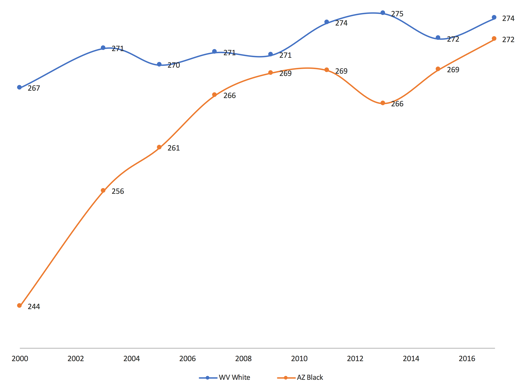
NAEP eighth-grade math scores for Arizona black students and West Virginia white students, 2000-17
Arizona has had the highest performing African American student population, and their NAEP scores have improved strongly over time. The 2-point gaps seen in both 2009 and 2017 were very close. Scores for both West Virginia Anglos and Arizona black students may take a hit in 2019 (both states experienced strike-related school closures), but this may not prevent the lines from crossing.
Apollo sends word: 2019 will be the year where the highest performing black statewide group will bank a statewide average NAEP score higher than the lowest performing Anglo statewide average. Which is not at all to say that this is high enough, but it is an important milestone we have yet to cross. I hope I am right on this one!
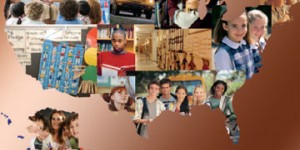 Every year the National Center for Education Statistics (NCES) releases its School and Staffing Survey, a treasure mine of interesting education tidbits for education data geeks.
Every year the National Center for Education Statistics (NCES) releases its School and Staffing Survey, a treasure mine of interesting education tidbits for education data geeks.
According to the latest (collected from 14,000 schools during the 2011-12 school year), 64 percent of private school 12th graders will go on to a 4-year college or university but only 39.5 percent of traditional public school students and 37.2 percent of charter school students will do the same.
But don’t get too excited. Some caution is needed before making a conclusion about the impact of these schools because there are big differences regarding students and teachers at these schools. For example, private schools are much whiter and more affluent than public schools. That might explain some of the 25 percentage point advantage in college enrollment rates.
But if being whiter and more affluent helps private schools, it doesn’t seem to do much for traditional public schools when compared to charter schools. (more…)
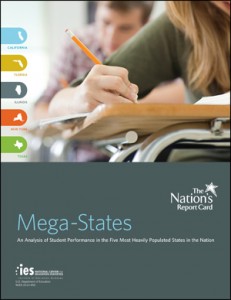 For the second time this week, a credible, independent analysis shows Florida students leading the pack in progress.
For the second time this week, a credible, independent analysis shows Florida students leading the pack in progress.
Between 1992 and 2011, Florida students made bigger gains than students in four other “mega states” in fourth- and eighth-grade reading and fourth-grade math, according to a report released Thursday by an arm of the U.S. Department of Education. In each case, they moved from below the national average to meeting or exceeding it. Low-income and minority students in particular showed traction.
“There is something real going on there,” said Jack Buckley, commissioner of the National Center for Education Statistics, according to Education Week.
The center’s comparison followed Wednesday’s College Board report that showed Florida continues to climb the charts on Advanced Placement exams. The Sunshine State now ranks fourth in the percentage of high school graduates passing AP exams. Over the past decade, it ranks second in progress.
Broken-record alert No. 1: Florida’s trend lines shouldn’t be a surprise, given reports like this, this, this, this and this in the past year alone. Yet there remains a lingering perception, cultivated by critics, that Florida’s public schools are sub par and stagnant.
For Thursday’s report, the center for the first time compared scores from Florida, California, Texas, New York and Illinois – the states with the biggest student populations and arguably the biggest challenges. It used results from the National Assessment of Educational Progress, a battery of tests better known as “The Nation’s Report Card” and considered the gold standard among standardized assessments.
In eighth-grade math, Florida students made gains but remain below the national average. Elsewhere in the report, they were singled out often. (more…)
Editor's note: This guest column comes from Julio Fuentes, the president of the Hispanic Council for Reform and Educational Options (HCREO), a national coalition dedicated to education reform that counts civil rights and Hispanic business leaders along with public school teachers and ministers among its supporters.
The history of our education system is marked by pivotal opportunities when leaders and policy influencers joined forces to bring about improvements and policy changes for the betterment of students. From public school desegregation to teacher quality measurements and standardized testing, the landscape of education has evolved and matured to best serve students and their families.
Last week, U.S. Education Secretary Arne Duncan urged parents, educators and school leaders at the local, state and national levels of government to seize the next of these pivotal opportunities – specifically, he said, we must make Hispanic educational excellence a national priority.
Secretary Duncan noted that the Obama Administration’s goal of having the world’s highest share of college graduates by 2020 will not happen “without challenging every level of government to make the educational success of Latinos a top priority. America’s future depends on it.”
Secretary Duncan’s call to action came in response to a new report from the National Center for Education Statistics (NCES), the U.S. Department of Education’s statistical center, which outlines in grave detail the Hispanic achievement gap that has long been of such concern to my organization and others. Hispanic students are the largest minority group in our nation’s schools, but they continue to fall behind. (more…)